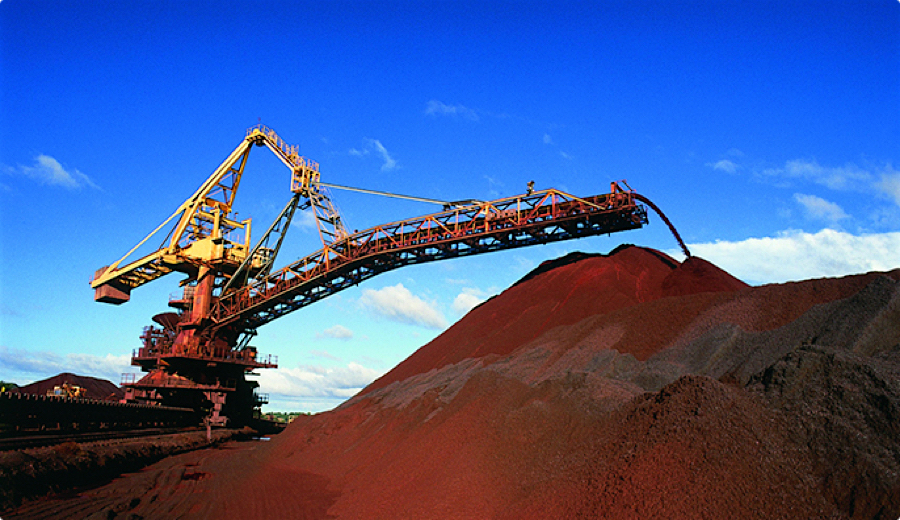China can’t control the price of iron ore, Vale CEO says

China may be the world’s biggest buyer of iron ore, but even that powerful position doesn’t mean that Beijing can succeed in dictating prices for the steelmaking ingredient, said the head of No. 2 producer Vale SA.
The comments by Vale chief executive officer Eduardo Bartolomeo come as China has appeared to ramp up its decades-long struggle to wrest more power over the iron ore market from Brazil’s Vale and its two Australian rivals, BHP Group and Rio Tinto Group, which together dominate global production.
A new centralized iron buyer, created last year to make purchases for the nation’s massive steel industry, has in recent weeks criticized iron ore prices as too high, and called for an improved pricing system. Separately, China’s top economic planning body has intensified a campaign seeking to cool a market rally this year.
But Vale is confident that prices will continue to be set by the balance between supply and demand, Bartolomeo said in an interview. And for the miners that’s good news, with the CEO predicting an increasingly tight market going forward. Vale on Tuesday said it expects to keep production little changed next year.
“The rule of the economics are going to drive the price, the rule meaning supply and demand,” Bartolomeo said in London ahead of the company’s annual investor day. “They cannot impose something on you.”
Iron ore has defied predictions of a slump by surging about 16% in the past six weeks, buoyed by Beijing’s efforts to support its struggling steel-intensive property sector. The metal is currently trading around $129 a ton, and has largely held above the key $100-a-ton threshold this year.
China, which produces more than half the world’s steel, sparked alarm through the iron ore industry last year when it created China Mineral Resources Group, the new state-backed firm trying to boost its sway over prices. Beijing has long complained the miners hold too much power because supply is so concentrated among the top three producers.
For Vale itself, iron ore is as important as ever. After selling businesses that spanned steelmaking to fertilizers, the company has now put its base-metals business into a separate corporate structure, with a standalone management, although it remains controlled by Vale.
As a result, the parent company is focusing even more on the iron ore that has long been its biggest and most profitable division.
Bartolomeo took the helm in the wake of a 2019 deadly dam disaster that killed as many as 270 people. The tragedy resulted in Vale losing the title of top iron ore supplier to Rio Tinto.
In the years since, the CEO has sought to focus on safety, and emphasized a value-over-volume strategy — by betting steel companies need high-grade ore to cut emissions — in addition to shedding non-core businesses and seeking to unlock value from its nickel and copper assets.
Bartolomeo’s term expires in May, and a succession process has begun to take shape in Brazil. He said a decision on his potential renewal should be taken four months in advance, and that he’s keen to continue as CEO.
“Of course, I want to stay,” he said, adding that he wants to capture Vale’s “unlocked value.”
Saudi deal
Earlier this year, the company announced a deal to sell part of the base-metals company to investors including Saudi Arabia, which agreed to buy a 10% stake as part of its efforts to diversify away from oil, in a deal that valued the unit at $26 billion. Vale had spent years looking at options to extract more value for the division.
The Brazilian miner says it will consider options to capitalize Vale Base Metals in two to three years, when projects in Canada, Brazil and Indonesia should start maturing. The company will need as much as $30 billion over the next decade to expand the business.
Potential deals could include an initial public offering, as well as a further stake sale.
“We’re open to whatever creates most value,” said Vale chief financial officer Gustavo Pimenta.
Bartolomeo’s positive outlook for iron ore mirrors that of Rio Tinto, the only company that produces more of the steelmaking ingredient. Rio expects demand to rise by almost a quarter by 2050, even as Chinese use peaks.
Iron ore producers are looking for new areas of growth after being able to depend on explosive demand from China for the past two decades. Vale, which currently sells about 63% of its iron ore to China, is aiming to bring that below 50% to reduce reliance on the Asian nation.
Bartolomeo, like Rio CEO Jakob Stausholm, sees production peaking in the country soon, but expects continued growth from elsewhere, especially India and other parts of Asia. At the same time, new sources of production will be limited until a huge new mine in Guinea starts up later this decade.
“The market is truly tight,” Bartolomeo said. “There is no supply coming.”
(By Mariana Durao and Thomas Biesheuvel)
{{ commodity.name }}
{{ post.title }}
{{ post.date }}




Comments